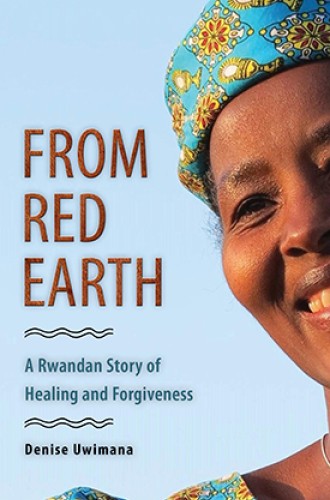25 years after the Rwandan genocide, Denise Uwimana tells her story
A memoir about survival and the theological questions it raises
“My way of seeking guidance had always been to open the Bible at random and see what it told me,” Denise Uwimana writes. “Western Christians have told me this approach is misguided.”
I’ve been one of those Western Christians, preaching derisively to my congregation about the open-and-point method. But after reading Uwimana’s account of surviving the Rwandan genocide, which happened 25 years ago, I won’t mock the practice again. Her rich depictions of lived faith make reading a book about a million people dying in a hundred-day period bearable.
Christianity permeates Uwimana’s story. When she married Charles, a lapsed Catholic, his Hutu priest refused to officiate—so they were wed in Uwimana’s parents’ church in Burundi, the country to which her family had fled from Rwanda when she was a child. After marriage, Uwimana expected Charles to lead them in prayer. She was startled when he told her, “I have no idea how to pray.” Eventually, however, he overheard a sermon from the doorway of a church and converted. They worked together at Cimerwa, a concrete company in Bugarama, Rwanda, he in management and she in administration.
Read our latest issue or browse back issues.
The Uwimanas and their Tutsi neighbors faced discrimination and menace before the genocide. Charles was imprisoned unjustly at one point, and Uwimana’s faith helped her navigate that ordeal. She turned to scripture after the mayor rejected her request to visit her husband in prison. “I will make you as hardened as they are,” she read in Ezekiel. “These words emboldened me to try again.”
Charles was inexplicably released from prison after six months, but by then he’d lost his management position. They were evicted from their home and forced to move to a duplex reserved for common workers. He was assigned a job 30 miles away and had to sneak back in the night to see his wife and their two sons.
Already raising two small children, Uwimana was heavily pregnant when the slaughter began on April 7, 1994. On April 16, the day the killing came to Bugarama, the leader of her church prayer group came to her gate offering to hide any valuables for her. Charles was away at work. She and family members frantically prayed and then hid.
Many died in Uwimana’s home that day, but she survived by giving the murderers all of her money. She put her two children in the care of a young man who helped her in the house and hid again, giving birth the next day in a neighbor’s home. After the neighbor cut the cord with a dirty knife, she insisted Uwimana leave with her newborn.
Uwimana and her three children found a haven for six weeks in the Cimerwa health center, but eventually they had to leave. Her account of surviving in Rwanda during the hundred days is harrowing. She describes the difficult theological questions her experience stirred. “Yes, God protected us today. But what will tonight bring? Or tomorrow? And what about the ones who died today—why didn’t God protect them?”
Uwimana turned to the Psalms to cope, finding her voice in lament. Her faith was badly shaken, particularly regarding Hutu members of her church. “Bitterness gnawed at my gut when I thought of our church elders. It must have been to people like them that Jesus said, ‘Not everyone who says, “Lord, Lord,” will enter my kingdom.’”
The second half of the book describes what happened after the slaughter was over. After a cease-fire was declared, Uwimana received a leave of absence from Cimerwa and went to her parents’ home in the Congo. But she soon joined other expatriate Tutsi in returning to Rwanda. Uwimana and ten of her relatives eventually found a house in Kigali. When Cimerwa reopened an office in Kigali, they told Uwimana that she could begin work immediately if she returned to Bugarama. While the idea of returning to her former home and its harrowing memories terrified her, she believed God had a task for her there. Over her parents’ objections, she and her sons returned to Bugarama after only three months away.
Every day, Uwimana encountered Hutu people who had killed her Tutsi friends or had looted her home. Her Hutu pastor preached about forgiveness. “I resented him, and all the Hutu Christians who had looked the other way during my trials. Even now, no one from church visited my home, although they knew I was back.” One day she saw a Hutu woman wearing what had been Uwimana’s best dress. She railed at God: “How can I live with these fiends, these devils, these killers?” God responded, “Who kept you alive for a hundred days?” That began Uwimana’s journey toward grace and forgiveness. Acknowledging that it was a process, she shares times that she realized she still held resentments. She also describes the costs of offering forgiveness—as other survivors sometimes saw that act as a betrayal.
Eventually, Uwimana left her job at Cimerwa to work for Solace Ministries, where she learned the healing power of listening and sharing stories. Almost all of the women who survived the genocide had been raped, and an estimated 70 percent had contracted HIV. Widows found that listening to other widows and caring about their pain helped them face their own pain.
This is a hard book to read, but people of faith must read it, especially to learn about the culpability of Christians in the genocide. We must ask ourselves Uwimana’s haunting question, “What if we had been the majority? Would we have killed?”
Some might call From Red Earth inspiring, and it is. But as a pastor responsible for forming disciples, I also found it humbling.
A version of this article appears in the print edition under the title “Faith after genocide.”






